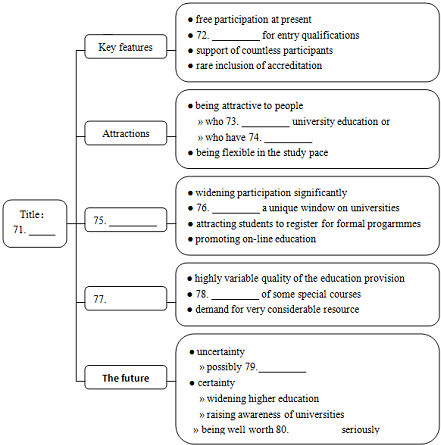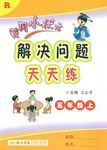题目内容
12.While there is no widely accepted definition of MOOCs,their key features are open access:they are currently free to participants,no entry qualifications are required,they support an unlimited number of participants and as yet,very few include any form of accreditation (认证).Currently offered by some famous universities,MOOCs are attractive to people who do not have the financial resources to meet the growing costs of university education,or who do not have formal qualifications.They also allow participants to study at their own pace.
The potential for MOOCs to deliver education is obviously vast-they could be considered as a huge step forwards in widening participation.They also have the potential to provide a unique window on universities that offer popular and valuable courses,they may attract some participants to register for formal fee-paying programmes at the same or other universities and are likely to promote new ways of on-line education.
However,it is still very early days for MOOCs.The quality of the education provision is highly variable,with many courses offering only recordings of lectures,and delivery is particularly difficult in some special fields that require practical classes,research projects or extensive library access.Besides,wider engagement with participants requires very considerable resource.Even limited feedback or examination becomes a major task if there are several thousand students in the class.
Considering the challenges,some people argue MOOCs will soon evaporate (蒸发).But they certainly provide good opportunity for widening higher education,are a means of raising awareness of universities to audiences of tens or hundreds of thousands,and are well worthy of serious consideration.

71.MOOCS72.no requirement73.cannot afford74.no formal qualifications75.Potentials76.providing77.Challenges78.particularly difficult delivery79.evaporating80.considering.
分析 本文是一篇事实类说明文.主要谈到有关MOOCs这个教育机构的特点、潜力、面临的问题及其未来的发展.
解答 71.答案:MOOCS.根据文章第一段MOOCs的特征和全文多处出现的MOOCs可知答案.
72.答案:no requirement.根据文章第一段"No entry qualification arerequired"可知,不需要资格论证.关键词require,而题中要填入的形式是名词形式,故用no requirement.
73.答案:cannot afford.根据第二段"MOOCs Are attractive to people who do not have the financial resources to meet the growing costs of university education,or who do not have formal qualifications."这一句中前面部分"who do not have the financial resources"可知.没有满足大学教育的成本增长的财政资源的人也可以上大学.
74.答案:no formal qualifications.根据第二段"MOOCs Are attractive to people who do not have the financial resources to meet the growing costs of university education,or who do not have formal qualifications."这一句后半部分,"who do not have formal qualifications."可直接得出答案.
75.答案:Potentials.根据第三段"The potentialfor MOOCs to…"和其后它的作用可知.
76.答案:Providing.根据文章第三段"They also have the potential toprovide a unique window on…"可直接得出答案.
77.答案:Challenges.根据最后一段第一句"considering the challenges,"可知,上面一段在说这MOOCs所面临的挑战.
78.答案:particularly difficult delivery.根据第四段中"and delivery is particularly difficultin some special fields that…"可知答案.
79.答案:Evaporating.根据文章最后一段第一句"considering the challenges,some people argue MOOCs will soon evaporate"可知答案.
80.答案:Considering.根据文章最后一句"and are well worthy of seriousconsideration."可知答案.be worth+doing.
点评 做此类题时,应根据空格前后的词语提示到文章中找到关键句子和信息,然后根据空格需要填入适当的形式.

 黄冈小状元解决问题天天练系列答案
黄冈小状元解决问题天天练系列答案 三点一测快乐周计划系列答案
三点一测快乐周计划系列答案--- .I'm half finished with it.( )
| A. | So far so good | B. | It's right | C. | It all depends | D. | Forget it |
What's the pretty small house that ____________ for?( )
| A. | is being built | B. | has been built | C. | is built | D. | is building |
| A. | measured; weighed | B. | measuring; weighing | ||
| C. | measured; weighing | D. | measuring; weighed |